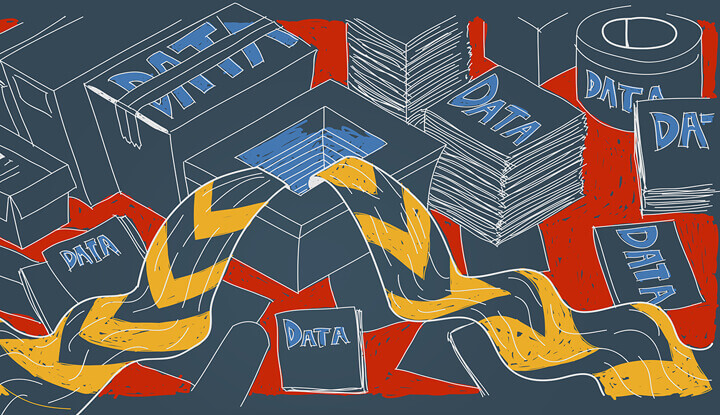
George Fuechsel, an early IBM programmer and instructor, is credited for coining the term, “garbage in, garbage out.” Fuechsel used it as a concise way of reminding his students that a computer just processes what it is given.
NB: This is an article from Revinate
While the term is most often used in the context of software development, ‘garbage in, garbage out’ can also be used to refer to any decision- making system where failure to access precise, accurate data could lead to bad decisions, which, in turn, lead to inaccurate results.
When you think about your hotel guest database and how you use it to make marketing decisions, you can easily see how Fuechsel was right.
Subscribe to our weekly newsletter and stay up to date
Think of your Property Management System (PMS) in the context of Fuechsel’s example above. It’s unfortunate, but true: your PMS has become the root cause of dirty guest data. This is because, unless a guest is logged into the website or booking engine, each time they make a new reservation, a new guest profile is created. They might use a different email, a work address versus a home address, or a shortened name (e.g. Mike versus Michael). Your PMS is not smart enough to determine that this is the same person that has booked before, unless all data fields match exactly. As a result, your database can become overloaded with multiple profiles of the same person, known as duplicates.
Over time, these duplicates pile up and cause your PMS to misrepresent the actual amount of guests that are in your database, and this is the real issue, because all of this inaccurate data not only makes your database more ineffective, it also puts you in danger of making ill-informed marketing decisions. As Fuechsel said, ‘garbage in, garbage out.’ Let’s break down how this affects you the most:
1. You can’t size your segments correctly
Understanding the make-up of your guest database is important for developing successful marketing programs. You need to know what percentage of your database is local versus international, business travelers versus leisure, planners versus last-minute bookers, etc. All these details help you spend your advertising dollars more effectively, develop promotions that will resonate with your guests, and predict return.
Deciding where to spend your advertising dollars is an important decision. If you operated a hotel in France and knew that 50% of your past guests came from Germany, you would probably want to localize your ads and advertise in German publications and sites. But if you weren’t able to accurately break down your past guests by location, it would be much harder to determine where to spend your budget.
Sizing your segments is also important for predicting revenue. For example, if you know that email marketing campaigns targeting your drive-to guests typically get a 15% open rate, a 3% click through rate and a .5% conversion, you can easily predict revenue, as long as you know how many real people you are emailing. With dupes and dirty data, you can’t accurately size your segments to predict campaign return. We can’t say this next bit enough: being able to predict campaign return isn’t simply a best practice; it will also help you prove the worth and value of your marketing efforts. This is crucial always, but especially during Covid times.
2. You can’t know your guests accurately
The whole point of having a hotel guest CRM is to be able to know your guests better and use that data to improve their loyalty and spend. If your data is messy, you run the risk of off-putting your guests by reaching out to them with the wrong message or, even worse, not reaching them at all.
For example, you might erroneously send a guest that just checked out last week a “we miss you” email that was, in fact, meant for guests who haven’t stayed with you in a year. Or, you might ask a regular guest if it’s their first time staying with you upon check-in, only to hear that they have stayed with you multiple times. Oomph. Never fun.
For each guest, you should easily be able to see their average number of stays, how loyal they are, their lifetime spend, and their preference data. While this is standard information that every hotelier should be able to quickly access, duplicate guest profiles make it nearly impossible to understand the real value of each individual guest. And without all of this crucial data and one true view of your guests, you are missing the opportunity to personalize every aspect of your engagement with them, from email to guest stay.
3. The clean-up work becomes overwhelming
Over the last couple of years, most hoteliers have realized the value of capturing emails to market to guests directly and drive OTA bookers to book with them on their next stay. In fact, OTA win-back campaigns have become one of the most profitable emails that hoteliers can send, but without a valid email, the guest never has the chance to book directly.
With a dirty and incomplete database, you can’t know how many guest profiles are missing email addresses or understand how many guests are actually reachable and, therefore, marketable. By keeping your database clean, you can understand the work ahead of you and put plans in place to improve your email deliverability and response. But who wants to take on the tedious and time-consuming task of manually cleaning their database? With new data streaming into your PMS every single day, this manual task alone could become a full time job for an independent hotel, let alone for a hotel group or chain. It’s clear that no one has time for this (and no, don’t put this on the intern either… that’s just cruel!).




